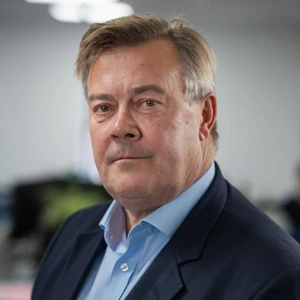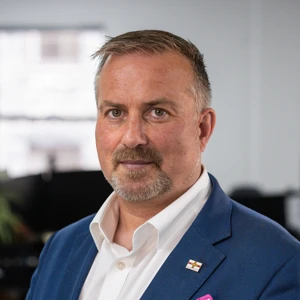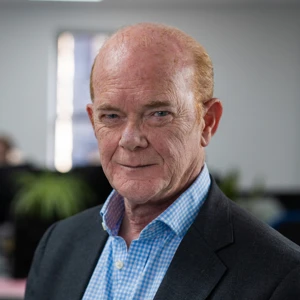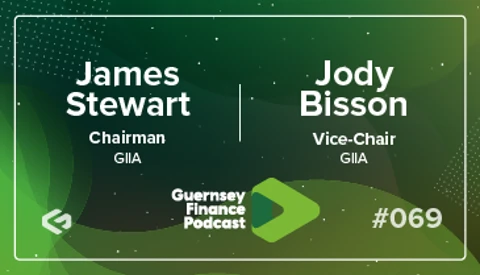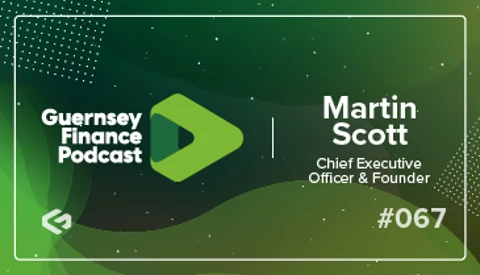In this episode, three members of Guernsey Finance’s UK Business Development Team join our Host Brandon Ashplant to explore the current trends in financial services in their respective regions. Jo Kitcat, London Representative, Rowan Stone, North of England Representative, and William Lewis, UK Insurance Representative, discuss Guernsey's symbiotic relationship in financial services with the UK economy.
Read the full transcript below
Brandon (00:00)
Hello and welcome to today's episode of the Guernsey Finance podcast, the show where we bring you interviews with top thinkers from across the global financial services industry. We dive into emerging trends and themes across sub-sectors from investment funds through to captive insurance and everything in between. My name is Brandon Ashplant. I'm technical manager of funds and private wealth here at Guernsey Finance, the island's promotional body for the financial services sector.
Today I'm talking to three members of Guernsey Finance's business development team who are all based in the UK. With me are Jo Kitcat, South of England representative, Rowan Stone, North of England representative, and William Lewis, our dedicated insurance representative.
Brandon (01:00)
Jo Kitcat has more than 20 years of experience in financial services, having built relationships across the UK, Switzerland, the US, and Asia. He has also played a role in developing global financial institutions' business in asset management.
Rowan Stone is our most recently appointed business development rep and brings more than two and a half decades of experience as a strategic brand marketeer to the role. Since joining Guernsey Finance back in June last year, he has focused on Northern England, predominantly in the Manchester region, to expand the awareness of Guernsey's finance offering, identify new opportunities, and share the story of Guernsey's world-class financial services industry, particularly in the rapidly growing property and tech sectors.
William Lewis holds more than 44 years of experience in the insurance sector, having gained a broad range of market knowledge, being an underwriter and a broker. He has previously worked on the formation of protected cell companies (PCCs) and has extensive experience with Guernsey's regulatory framework. He is also a director on a Guernsey PCC.
Today we'll be discussing the current trends in financial services in the United Kingdom and how Guernsey offers solutions and expertise as a member of the British family. So without further ado, welcome guys. Thanks for joining us.
Rowan Stone (02:12)
Morning.
Jo Kitcat (02:12)
Morning.
Brandon (02:14)
Great. So Jo, if I could just start with you, I don't suppose you could sort of set the scene for us and maybe give us a bit of a flavor in terms of, you know, what's the mood in the city? What are the kind of key talking points you sort of tend to hear?
Jo Kitcat (02:26)
I think at the moment, Brandon, and good morning, a lot of it is the uncertainty. I think if you look at the global macro situation, you look at domestic politics across the globe, this is creating uncertainty, both in terms of how people are feeling, but also in terms of if you're a wealthy global family or you're an international business, what do you do about the uncertainty created? So I think it's making people think, where should we control our assets from? Who should we be involved with? And obviously with that, nobody actually quite knows where we are going at this stage.
Brandon (03:05)
And obviously there's been an election in the last year and a half, six months, nine months in the UK, we've got a new Labour government. What's the sense on the ground amongst city professionals regarding policy changes being brought into play?
Jo Kitcat (03:20)
Yeah, so I think, you know, with the non-dom side of things, with high networks, there is definitely, on the high network side of things, there is definitely big movement of individuals thinking about where to set themselves up from an investment point of view, where to go and the city is full of really, really strong advisors. And the city will continue, I think, to be a centre of advice, but the fact of the matter is that a lot of that advice will be given to people who have either moved out of the UK or advising international people from the Middle East, from Asia or the USA about where to put their assets.
Brandon (04:05)
Interesting. And from sort of a Guernsey perspective, we'll come onto this later on a little bit in more detail, but obviously Guernsey has been demonstrated recently in such reports as the Frontier Economics report, but also sort of reports produced by Proskauer-Rose and others, sort of demonstrating that value set of Guernsey's sub-sectors across sort of, you know, funds, insurance, private wealth, and so forth, in terms of delivering value into the UK economy. Not just the city as well, but the real economy and all four nations and across the UK generally. Do you consider Guernsey's offering in terms of the offering to the UK beyond the buzzwords and the talking points?
Jo Kitcat (04:43)
Yeah, the buzzwords are strong regulator, fantastic infrastructure. But I think it comes down to one being it is part of the UK setup, it is a protectorate. So therefore, Guernsey is able to offer that aspect of it. But it's worth bearing in mind that the advisors, the lawyers, both on the wealth side and the fund side, fund administrators, the trustees, I mean, these are highly qualified, highly professional individuals who have fantastic relationships with the London-based advisors or the UK-based advisors, I should say. And also in some cases have, you know, more of an international play themselves. So I think you will see Guernsey perhaps, you know, from a Guernsey structure, seeing more and more investment going into the UK as well on one side of it, but also the utilization of UK and Guernsey or the relationship between Guernsey and UK-based advisors I think is very strong, which also adds value to both economies.
Brandon (05:44)
And Rowan, no doubt, many of the sort of macro trends that Jo's just identified there and are, you know, to start this conversation, probably be observed across the other Northwest regional parts of the country. Obviously Manchester is your focus area. For those who are unfamiliar with that part of the nation, can you just describe what the ecosystem looks like, what are the sort of trends you've identified? And also, I suppose most importantly from a Guernsey perspective, what's the opportunity for Guernsey?
Rowan Stone (06:13)
Excellent. Yeah, Jo, excellent synopsis. I think you've nailed the trendset. Manchester is a very large area to start with. You're looking at 2.7 million people within a small drive time and within a 60-minute drive time, 7.3 million. You're talking of 2.4 million people within the greater, I would say, north area working within financial services or related businesses. Obviously the region has a GVA of 78.7 billion and it's a big area and it has a diverse range of industries, everything from obviously life sciences, as you would expect, tech, we could go through the more financial services profession. I'm not going to go through all of them, but it's a very diverse cross-section. But what we've also still got is an element of manufacturing, engineering, all these different opportunities. But what's driving at the moment is probably the development of the digital and tech arena, which is a five billion pound ecosystem, which is- it's everything from startups through to your AWS, your Googles, your Microsoft, and they're putting their offices in Manchester. These are not regional offices. These are head offices that are going in. And I concur with what Jo says. Jo is right in saying London is the centre of this, where a lot of this happens. You know, London is a world capital. There is still no doubt about this. Manchester is sort of vying not to be a British major city, but a European city. And this is what it's pushing forward for. And the student population in Manchester is 100,000 plus and 60 to 70 percent of those are staying on and a lot of them are going into the digital and tech arena and of course that's then driving the property market so it's self-fulfilling if you know what I mean so one is driving the other and from a Guernsey point of view because the industry is- Manchester is relatively I would say the new Manchester is relatively new Guernsey offers that ability to offer stability. Obviously, Jo's already mentioned the range of services that Manchester doesn't possess. I mean, just off the top of my head, I think there's about 23,000 millionaires based in the region to start with. And then some of those are looking at potential options and future. People are not staying in one place anymore. They're moving across areas and ones. So Guernsey offers that beautiful stable relationship which they can have and still within being part of the great British family, so to speak.
Brandon (08:47)
Interesting, and from a Guernsey offering perspective, obviously you've touched there on some of the key growth areas for the city, obviously tech being there in terms of importance, but also sort of VC and real estate as well. I think you've talked about before at previous Guernsey finance events as well. Is, you know, is there a tie in here because obviously the growth of real estate and sort of alternative investment classes is obviously very much on the up. But obviously Guernsey's got a well-trodden sense of experience in terms of structuring alternative investments, whether it be in various vehicles, but also the sort of back office elements of expertise, you know, where's the tie in there and how can sort of Guernsey join up the dots from a Manchester perspective.
Rowan (09:30)
I think the appeal is very simple, Brandon. Guernsey's seen as a very stable and safe domicile as we know. I think that Jo's touched on it and it has an excellent history. You know, Manchester's a new boy on the block. It really is. I mean, I think we'll touch on the PE in a minute, but it is a new boy on the block and it needs that experience, that infrastructure, all of those things, because it's growing at a ridiculously fast pace. So Guernsey can offer those services that you just can't buy and then can't put in. The reputation for delivering it is also there. So it's just a no-brainer really for people in the Northwest to be looking at people in Guernsey and saying, well, they've done it before. They've done it for 50 years. Why break the mold and try and do something different? London's used it very, very well over the last 50 years. Why shouldn't Manchester use those companies?
Brandon (10:20)
Yeah. And you've mentioned previously, obviously you, three of you were here in Guernsey back in January for the Industry Update event. And one of the things I remember you mentioning, Rowan, was this idea that sort of Manchester is actually one of the UK's fastest growing and increasingly important in that private equity space, not just from a UK economy perspective, but from a European perspective as well. You know, why is that? And what's growing that?
Rowan Stone (10:45)
So, it's quite interesting. I mean, I was quite surprised when I attended a PE event to find out it's the second largest PE market in Europe, which, you know, London is head and shoulders above. I mean, I'm not going to suggest that we're catching up. But in terms of other cities, if you look at the back history back in the 1980s, 1990s, Manchester was probably in the same league as Birmingham or Leeds. It is now head and shoulders in front of those cities. And its idea-wide area is the small and medium size opportunities. Although the big opportunities are always going to go to London, the experience is there, the knowledge bank is there. What's interesting is when you go to Manchester now, you've got about 12,000 lawyers, which is 150 law firms, got five and a half thousand chartered accountants, you've got the wealth managers, you've got the infrastructure that previously did not exist in the north. And these are partners who are coming up, not just to fill spaces in a regional office, they want to actually work on those interesting and big projects that are coming in. In terms of PE, it's fascinating to see how it's growing. And there's a lot of optimism in the North at the moment. The figures that are coming out all the time are absolutely fascinating. I'll give you an example of a fact which I thought was quite extraordinary. Now 80 of the FTSE 100 actually now have an office in Manchester, which I think is quite extraordinary. If you'd said to me that years ago, I would have laughed at you. Just why? But when you're seeing the money coming up, the money coming through, the opportunities, diverse nature of the opportunities in terms of tech, bioscience is also very large in the Northwest, but then you've still got the manufacturing, the engineering, and of course this is driving the property market. And these are very hungry, hungry opportunities that need investment. It's in my brain, ideas, it's no-brainer really, the Northwest.
Brandon (12:40)
And just to sort of round that point off, appreciate we sort of talk there a bit about Guernsey's trodden path in the alternative space and sort of on the VC front. Obviously we just talked there about, you know, Manchester is sort of a second hub, if you like, in terms of European PE. Obviously Guernsey is a world-class player in that space. What's the tie in there do you think? And where again, can Guernsey join up dots with Manchester?
Rowan Stone (13:07)
That's very difficult, Brandon. That's a very difficult question. And I'll tell you why, because Jo has already covered it. I think I've covered it. It's the plethora of world-class services that Guernsey possesses, which when you've got a new boy like Manchester coming in, it's literally got only a decade, a decade and a half experience here. Why wouldn't you go to Guernsey, which has already had that experience? I mean, I used the word in... recently is a no-brainer really, because it does possess the experience to say, you know, the recent Moneyval report, it ticks all the boxes. So the alternative? Well, the alternatives we know are there. But actually, the natural progression is for these companies to look at Guernsey and what it provides. It literally is, I just keep saying to people, it's an hour and ten minutes on a plane. It's only 20 minutes further than Jo. It's, you know, it's, offers, it's being a rock as Guernsey is, it offers that stability. I think that the whole concept of the image of a rock is exactly what it is.
Brandon (14:10)
And Jo, obviously we've talked about there, a bit about the value in terms of Guernsey to the UK. And we actually touched on your previous questions about sort of Frontier Economics. For those who don't know, the report is titled "The Value of Guernsey's Financial Services Industry to the UK Economy." It was published last year and outlined some interesting findings. So 57 billion pounds of international capital investment from around the world is funnelled into the UK on an ongoing basis with Guernsey investment into UK assets having increased 14% per annum since 2020. And then that's obviously framed at a time when FDI into the UK is actually falling. And 13 billion of that would not have made its way into the UK had it been domiciled in any other sort of global finance centre beyond the Channel Islands as it were. That's probably worth noting as well. You touched on earlier, Jo, the service point Guernsey provides to the UK economy. How do you think Guernsey's offering to the UK will develop in 2025 and going forward?
Jo Kitcat (15:17)
I think, Brandon, we are in a unique position because of the uncertainty that's been created. So I think you'll find the wealth moves around the world and it will position itself from an administration point of view in Guernsey, maybe have some family offices from an admin point of view based there. But a lot of their advisors will still be based in London. So you're going to see wealthy people, wealthy families still want to visit London, although they might live somewhere else. And then obviously, Guernsey being part of the British, the Great British family, I think will continue to contribute in that way. And I think that also then, there's always a cross-referencing to venture capital and private equity. And there's an increasing number of people who will want to have their funds administered from Guernsey. And those funds will be investing more and more into the UK. Because a lot of those funds, advisors might be in the States, but the States will have lawyers who are also London-based, the US and London. So you'll suddenly see US funds maybe want to establish themselves in Guernsey. And from Guernsey, those funds might well invest further into the UK. So I think with the uncertainty that's been created, it's created an opportunity, one, for Guernsey, but also because of our really good and unique relationships I think with the UK and increasingly say with places like Manchester, London is still this international centre of which we are a part and have a fantastic relationship with. So I think moving forward we've got a great opportunity and I think we can really help the UK attract investment.
Brandon (16:53)
And obviously we've sort of talked quite a bit about the funds offering and the investment management offering and also the sort of private client offering there. But turning now to Willie to talk a bit about the insurance perspective. 2024 was a busy year in the captive world and clearly a great one again for Guernsey as well. The island was again crowned European captive domicile of the year. The Frontier Economics report, which we've just mentioned and touched on there, found that 40% of FTSE 100 companies have a Guernsey captive vehicle saving UK firms almost £100 million per annum. Taking a step back from all that and thinking a bit about it, what do you see as, I suppose, the broad offering from a Guernsey perspective into the UK, Willie, from an insurance perspective, for those who are sort of less clear on the sector?
William Lewis (17:41)
I think one of the main messages we got out of 2024, is that captives are becoming more mainstream and more and more people are looking at captives. A recent survey by risk managers who haven't got captives and asked them how many of them would potentially be looking at captives, and 72% said yes. That is a very high number and a huge opportunity for Guernsey. I mean, you only have to think why Guernsey remains the premier European captive domicile. And we've talked about the ecosystem and the support that all the industries get, but that includes insurance, where we're looking at the lawyers, the accountants, and the regulators are very much supportive of the insurance industry in Guernsey which is why it does attract, as you say, 40% of the FTSE 100 have Guernsey captives. I suppose I'm interested to find out about the other 60% and the Airmic survey figure where they talk about 72% of the risk managers looking to set up captives, I think presents a fantastic opportunity for Guernsey. And there's already been mentioned, we've had the Frontier Economics Report, we've had the Moneyval Report, all of which tick more boxes for Guernsey and puts Guernsey in a very strong position when looking at the jurisdiction to set up a captive.
Brandon (19:22)
And what do you see as being the most sort of important development in the insurance space? Perhaps UK domestically, but perhaps globally. And what do you see happening sort of taking place?
William Lewis (19:32)
Well, as we know, the UK government is in the middle of a consultation process about UK captives. We await to see where that comes out. I see that as very much a slow burner. I don't think it's going to turn the world of captives on its head overnight because of, as I said, you've got a Guernsey Insurance industry that's been around an awful long time. Virtually invented captives, invented protected cell companies, and is in a great position to take advantage of that experience and the depth and breadth of the support that the infrastructure gives. I mean, you only have to look where Guernsey positions itself, not only picking up mainstream captives and other insurance structures. During 2024, we had reinsurance capacity structure being formed to cover war-related risks in Ukraine. You had the Red Cross setting up a CAT bond for disaster relief fund. You had the Merchant Navy's rating pension fund setting up again an insurance structure for the longevity swap. And Californian wildfire CAT bonds using Guernsey structures. So all of these things are not only the mainstream, but we have a very good track record of setting up niche structures, enabled to solve problems. And that is assisted by the regulators and the innovation that the Guernsey managers bring to insurance solutions.
Brandon (21:19)
Interesting. And Willie, just to close, how do you see Guernsey's industry progressing in 2025 and what are you looking forward to in the era ahead?
William Lewis (21:27)
I think, well, as I said, probably more of the same in the sense that Guernsey has this record of offering solutions to problems other people seem to kind of shy away from and has an amazing track record for that. And as captives and other insurance structures become more mainstream globally, I think Guernsey is very well positioned to really take full advantage of that. I just see the industry going from strength to strength, rather than necessarily reinventing the wheel.
Brandon (22:05)
Interesting. Well, that's all we have time for today. Thank you very much for joining us on the podcast today, Jo, Rowan and Willie. Thank you.
William Lewis (22:12)
Thanks, Brandon.
Rowan Stone (22:13)
Thank you, Brandon.
Brandon (22:15)
Thanks also to you for listening. If you enjoyed this discussion, we have an extensive back catalogue of interviews on the Guernsey Finance podcast channel. You can check them out by searching for Guernsey Finance on your preferred podcast platform. If you would like to find out more about Guernsey's offering, visit our website, guernseyfinance.com. If you would like to contact any of the team that I've spoken to today, their contact details are linked in the episode description. We look forward to welcoming you back soon. Until then, it's goodbye from Guernsey.





